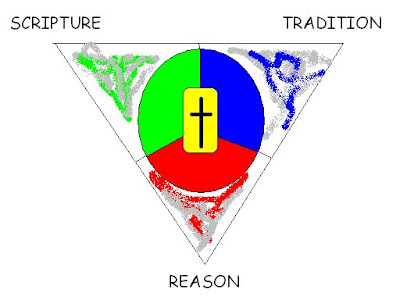I did manage to record the talk, but I’m not sure I want to post it as I was very dissatisfied with the outcome. There were many positive aspects, and I think it’s set the framework for the coming weeks, but it made me realise that some of the things I am arguing for need to be much more fully explained and supported. There’s still time for that but it does make me think I’d be better off keeping the reception of that talk to those who were there. As and when the perspective is more fully baked, I’ll write it up on the blog.
UPDATE: nothing like a walk with Ollie on the beach to clarify things. The problem is that I wasn’t careful enough this morning to distinguish between ‘evangelicalism’ – in the sense I want to criticise – and the green area on my chart. I want to, at one and the same time, affirm the essential nature of the green area, and criticise some aspects of it that have a centrifugal tendency and want to separate themselves off from the main Body. In other words, I need a different term, either for the green area itself or for what I am wanting to critique. Perhaps it would be best of all to abandon ‘evangelicalism’ completely as it may be too nebulous a term for practical use (which would rather undermine the title of the series as a whole! but that might be the right thing). How about keeping ‘Scripture’ or ‘the Scripturalists’ or ‘the Scriptural perspective’ for the green area – because then the role of the green area is clear; and then using ‘Modern Protestantism’ for what I’m wanting to criticise? I have a feeling I’ve used that phrase before…
Actually I can keep the title – I just need to be clear that evangelicalism as such is not what I’m arguing with, and I need to be disciplined in using that term “Modern Protestantism” for what I AM arguing with!



